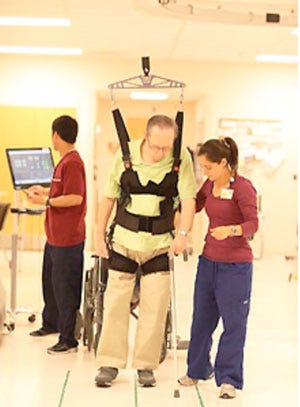Vector System Helps Patients Learning to Walk Again
December 18, 2013
The University of Maryland Rehabilitation & Orthopaedic Institute, once known as Kernan Hospital, is the first U.S. institution to install Bioness Inc.'s Vector Gait and Safety System. Bioness says that its system "enables rehabilitative teams to increase patient mobility while preventing falls and reducing the risk of injury." The system is now also installed at Cincinnati (OH) Children's Hospital and WakeMed Rehabilitation Hospital in Raleigh, NC.
|
Robotic training system helps patients recover from conditions affecting balance. (Courtesy of University of Maryland Rehabilitation & Orthopaedic Institute) |
The system suspends the patient from a sling attached to a computer-controlled trolley which travels a track mounted on the ceiling. Bioness says that stroke and spinal cord injury patients as well as amputees and those with orthopedic injuries may see more-rapid physical therapy progress with its system.
Peter Gorman, MD, chief of the division of rehabilitation at the Rehabilitation & Orthopaedic Institute, says, "The body weight support gives the patients the security to know that they will not fall, and the degree of support can be adjusted as the patients regain strength and mobility," Dr. Gorman is also an associate professor of neurology at the University of Maryland School of Medicine.
Bioness explains the Vector System provides a customized gait training solution for patients of all levels. Leveraging dynamic body weight support, the Vector System allows patients to perform pre-gait activities, practice over-the-ground gait rehabilitation, and accomplish activities of daily living training." The company provides a number of videos on their website showing how the system works.
Although the actual therapeutic benefit seems unlikely to be significantly greater than that of suspending the same patient over a treadmill, the trolley-and-track system may improve outcomes by affording patients the sensation of moving over the ground. "Patients who have used the Vector tell us that they feel extremely secure, which gives them the confidence to progress in their rehabilitation," says Lori Patria, director of rehabilitation therapy services at the Rehabilitation & Orthopaedic Institute.
About the Author(s)
You May Also Like



